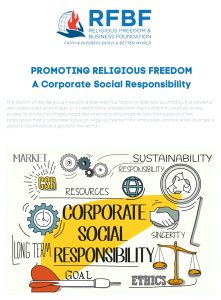Promoting Freedom of Religion and Belief: A Corporate Social Responsibility
New research highlights a significant upside to businesses from a focus on freedom of religion or belief. Making religious freedom a part of corporate social responsibility (“CSR”) can produce direct, positive benefits to company operations, improve economic markets, and lead to lasting changes in communities where the human right of religious freedom traditionally lacks roots.
Although states traditionally held the responsibility for the protection of human rights, states have encouraged organizations to assume responsibility for human rights within their sphere of influence. The Secretary-General’s Special Representative for Business and Human Rights, Professor John Ruggie, wrote in a report to the Human Rights Council that “[b]ecause companies can affect virtually the entire spectrum of internationally recognized rights, the corporate responsibility to respect applies to all such rights.”
CSR polices based on human rights allow corporations to fill an important vacuum in states that abuse, neglect, or lack adequate resources to protect human rights. CSR is the idea that businesses have a responsibility to a wider range of stakeholders in society than their shareholders.
Conceptually, CSR has evolved from businesses defensively attempting to minimize their negative impacts on society to now recognizing a responsibility of businesses to actively improve societies.
This white paper examines the human right of religious freedom as a CSR initiative. In particular, the paper discusses international standards-setting instruments’ recognition of religious freedom as a part of CSR policy, benefits to businesses of preserving and promoting religious freedom, and the corporate role in establishing and maintaining religious freedom. Read more.
Also see:
The Heart and Soul of Corporate Social Responsibility: Faith & Belief (24 Apr, 2021)
Promoting Religious Freedom – A Corporate Social Responsibility (30 Apr, 2021)

